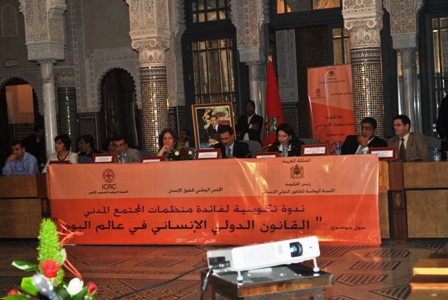CNDH CALLS FOR A LAW TO CRIMINALIZE SERIOUS VIOLATIONS OF INTERNATIONAL HUMANITARIAN LAW
"Respect for the international humanitarian law is only a first step towards effective implementation. It is necessary to take a set of procedures and legislative and administrative measures to implement the provisions of this law..."The Moroccan National Human Rights Council (CNDH) organized, in cooperation with the National Committee on International Humanitarian Law, a training session on the international humanitarian law for civil society associations, on October 17, 2011 at its headquarters in Rabat.
Third of the kind, this training session was supervised by Moroccan and Egyptian experts in the field of international humanitarian law. It aimed to disseminate the principles and norms of international humanitarian law, raise awareness and knowledge about the different aspects of this law and help strengthen the capacities of NGOs in the field.
Speaking at the opening session, Mr. Mohamed Essabbar highlighted the great importance of the international humanitarian law today, particularly with the growing tensions in different parts of the world and the related violations of fundamental rights and human dignity, especially against civilians who are not involved in armed conflicts. He underlined the importance of such trainings to help strengthen the capacities of the participants in order to better understand the principles and values of this humanitarian law.

The founding law of the Moroccan National Human Rights Council gives it a broad mandate in the field of international humanitarian law, he said. Article 19 stipulates that “the Council shall seek to promote the principles and rules of international humanitarian law and make sure they are deeply rooted.”
The preamble of the Moroccan new Constitution provides for the protection and promotion of the human rights law and the international humanitarian law. The new Fundamental Law criminalizes genocide, crimes against humanity, war crimes and any other systematic grave human rights violations.
For her part, Ms Farida Khamlichi, chairwoman of the National Committee on International Humanitarian Law, gave a comprehensive presentation on the committee, its mandate, structure etc.
The organization of this training session, she said, is a new tool in an ongoing process to which the committee is committed, taking into consideration the leading role civil society can play in the implementation of the international humanitarian law through the dissemination of its provisions or the reporting of any serious violations.
Mr. Mohammed Al Bazzaz, professor at the University of Law in Rabat, shed light on the relationship between the international humanitarian law and the human rights law. They are two independent but complementary systems. They both aim to ensure comprehensive protection of human rights, he concluded.
Dr. Cherif Atelam, Egyptian expert, presented the International Committee of the Red Cross and the efforts it makes to ensure respect for the international humanitarian law. The committee works worldwide to provide humanitarian help for people affected by conflict and armed violence and to promote the laws that protect victims of war. Its mandate stems essentially from the Geneva Conventions of 1949.
Morocco acceded to the optional protocols to the four Geneva Conventions on the protection of victims of armed conflict, signed on August 12, 1949. It signed the first protocol on the protection of victims of international armed conflicts, and the second protocol on the protection of victims of non-international armed conflicts on December 12, 1977.






















